12 Best Probiotics For Kids
This post may contain affiliate links. As an Amazon Associate, I earn from qualifying purchases. Please read my disclosure.Probiotics can be one of the most natural, effective, and safest ways to boost your family’s digestive health and immunity. But how do you find the best probiotic for kids? In this helpful guide, you’ll find out what to look for (and what to avoid) when choosing a probiotic for your child. We’ll review the 12 best probiotics for kids, infants and even teenagers, in addition to answering all of your questions about probiotics, things to consider, where probiotics can naturally be found, and why your kids might benefit from them.
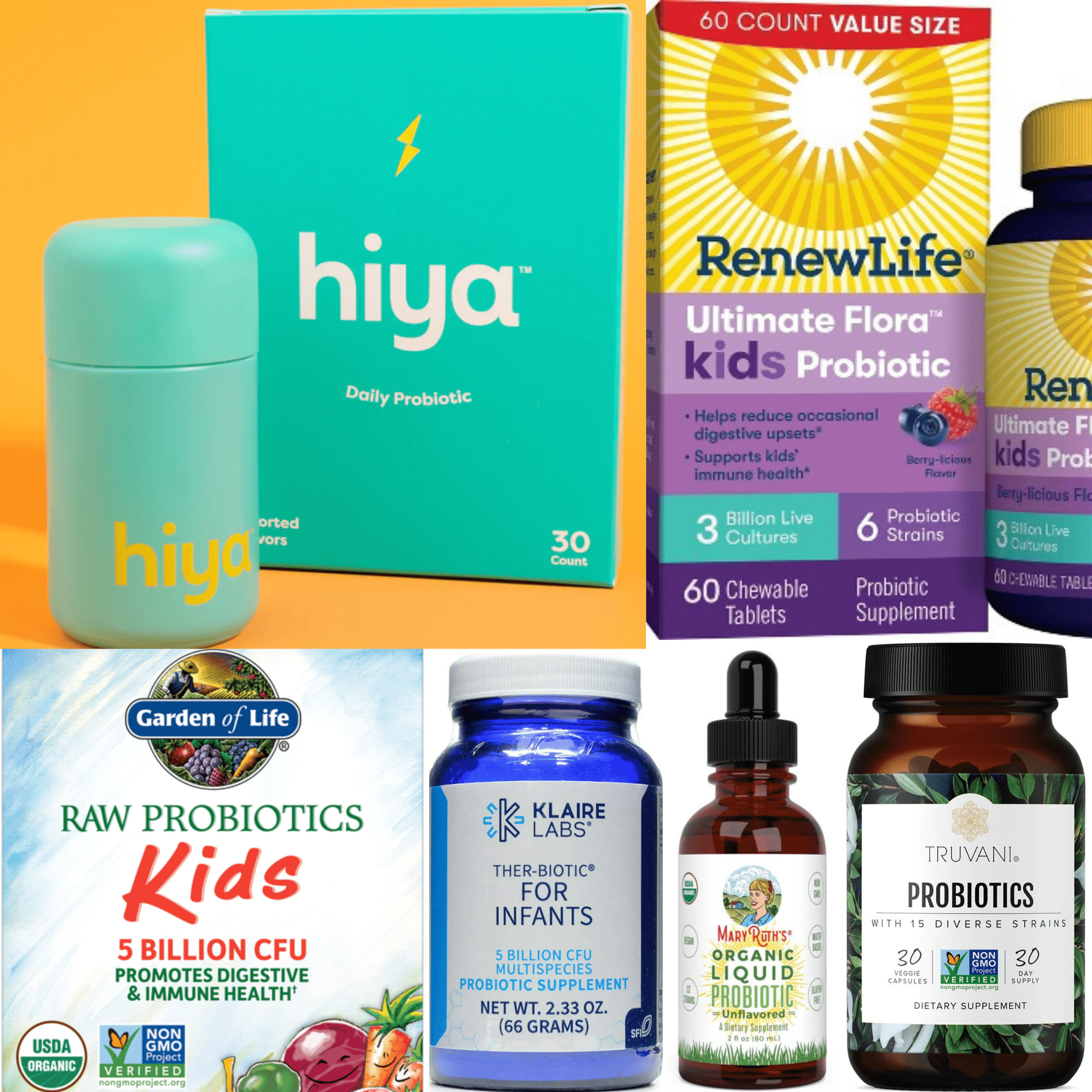
If you’re like most parents, the word “bacteria” might send you into a panic. Even a little infection can have huge consequences for your kids. So anything you can do to keep your kids healthy will probably be high on your list of priorities.
But it’s important to remember that not all bacteria are bad. In fact, we need certain types of good bacteria in our bodies in order to function at our best.
Research shows that having the right type of gut bacteria can improve digestive function, reduce gastrointestinal issues, and boost immunity (for both adults and kids!) A healthy gut flora may also promote weight loss, enhance skin health, and reduce the risk of numerous diseases in adults.
If you (or your kids) don’t have enough of this gut friendly bacteria, your whole system might be out-of-whack. For kids and infants especially who struggle with digestive issues or need an immune boost, supplementing with probiotics can alleviate some of those concerns.
So if you’re wondering “what is the best children’s probiotic?” this guide is for you!
What Are Probiotics?
Very simply put, probiotics are the good bacteria that live in your digestive tract (in your gut). You always have good and bad bacteria in your body, but the beneficial bacteria typically outnumbers the harmful bacteria. When you get sick, there’s more bad bacteria which makes your system imbalanced.
One job of the probiotics in your gut is to help eliminate the extra bad bacteria, keeping your immunity up and your digestive system healthy. When you hear about the “gut microbiome,” that just means the mix of and balance between the good and bad bacteria in your digestive system.
What Are The Benefits Of Probiotics?
Probiotics are living organisms (which can be bacteria or yeast) that can benefit your body in a number of ways. Here are some of the health benefits of probiotics:
- Create vitamins for the body
- Improve metabolic function
- Strengthen the immune system
- Boost your digestive system (especially after a round of antibiotics or after an illness like food poisoning).
- Reduce the severity of certain allergies or eczema
- Reduce symptoms of certain digestive conditions – e.g. inflammatory bowel diseases (such as ulcerative colitis or Crohn’s disease).
Are Probiotics For Kids Safe?
Yes, overall, probiotics for kids are considered safe. However, some children should not take probiotics, and those include kids with a compromised immune system or serious illnesses (like cancer), or premature infants.
When it comes to choosing the best probiotic for your child, you need to speak with their pediatrician first to determine what the best option might be depending on their needs. Once your pediatrician gives you the green light to choose any probiotic for your child, this guide will help you choose between the 12 best pediatric probiotics brands!
How Can Children Benefit From Probiotics?
Keep in mind that while probiotics will often provide different advantages for adults, children can still benefit from incorporating this healthy bacteria into their regular wellness routine.
Children who need immune support or are more susceptible to stomach bugs, digestive problems, and other illnesses may find some relief with probiotics. In cases involving children with acute gastroenteritis, for example, certain probiotics were found to reduce the duration of a stomach bug.
In addition, children who need to take an antibiotic for recurring ear infections, dental illnesses, or other issues may experience side effects – and probiotics can help to counteract (or even prevent) those symptoms.
Other reviews suggest that probiotics may prevent respiratory tract infections, which may be helpful for families who rely on daycare or preschool. Children with gastrointestinal disorders, like IBS (irritable bowel syndrome), may experience improved symptoms after incorporating different strains of probiotics into their routines, too.
While many parents might dismiss the idea of probiotics for children, preliminary research suggests that these helpful bacteria can make a positive difference for many kids.
Note: If you’re looking to really support your child’s immune system, you can pair probiotics with some of these additional options from our best immune boosters for kids guide.
And if you have a teenagers in your family, check out my 2023 guide about best vitamins for teens.
Summary: The Best Probiotics For Kids
You can find a much more detailed view of all of the best kids probiotics below in this guide, which includes information about price, ingredients, and pros & cons for each!
- Best overall probiotics for kids: Hiya Probiotics
- Best refrigerated probiotic for kids: Garden of Life RAW Probiotics Kids
- Best shelf stable probiotic for kids: Hiya Probiotics
- Best organic probiotic for kids: Mary Ruth’s Liquid Probiotic
- Best chewable probiotic for kids: Hiya Probiotics
- Best probiotic gummies for kids: Llama Naturals Gummies
- Best probiotic powder for kids: LoveBug Probiotics
- Best probiotic supplements for infants: Bobbie Probiotic Drops
- Best probiotics for toddlers: Hiya Probiotics
- Best probiotic for teenagers: Truvani
What Should You Look For In The Best Children’s Probiotic?
- Type of Probiotics: Probiotics come in numerous types such as tablets, capsules, drops and powders. Choose a type that is best suited for your child, that you will easily be able to incorporate into your daily routine.
- No Added Fillers or Stabilizers: You don’t want added fillers or stabilizers in your probiotics that are unnatural. The best probiotics for children will avoid these added fillers and stabilizers.
- No Added Sugar: Some probiotics add sugars to make their supplements taste sweeter. Avoid these if possible.
- Suitable Age and Dosage: Choose a probiotic that is suitable for the age of your child. Some probiotics are only safe for children 12 and older, while others are only suitable for infants. Some probiotics are suitable for all ages but then you must be careful to administer the appropriate dosage.
- Purity and Potency: You want to make sure your probiotic is tested by a 3rd party for purity and potency. Purity means that your supplement is not contaminated with heavy metals, potency means that the probiotics included are live bacteria (not dead or inactive).
- CFUs: Look for probiotic brands with at least 2-5 billion CFUs at a minimum.
- Strains: Look for a probiotic with multiple strains. Different probiotic strains produce different results for your child’s digestive and immune health.
- Expiration: When purchasing a probiotic be sure to check the expiration date. Choose one that gives you plenty of time to use before it expires.
What Should You Avoid In Probiotics For Your Kids?
There are so many probiotic companies today, and the probiotics for kids are usually filled with artificial colors, sweeteners/added sugars, and may have less beneficial / cheaper strains of probiotics! When you’re looking for the best probiotic for your child, here are the ingredients to avoid:
- Heavy metals
- Artificial sweeteners (including stevia)
- Added sugars
- Artificial colors
- Artificial flavors
- Preservatives or stabilizers (like carrageenan, gums, etc.)
Note: Before starting any probiotic, make sure to consult with your child’s pediatrician first.
Are Some Strains Of Probiotics For Kids Better Than Others?
Yes! Not all probiotics are the same. Every person’s gut flora – the community of microorganisms within your gut – has a different array of bacteria.
This means that different strains of probiotics will prove more beneficial for some people than others. Some strains have also been shown to be more effective in treating specific conditions. The probiotic you choose (either for yourself or your child) will be unique.
However, there are some probiotic strains that are known to be among the most beneficial, and most of the best children’s probiotic brands will include at least one of these (if not more). They include:
- L. Plantarum: This probiotic can boost iron absorption, fight off pollutants, neutralize harmful intestinal bacteria, ease bloating, and speed up the digestive process.
- L. Acidophilus: As one of the most well-known strains of probiotics on the market, this option can prevent or reduce diarrhea, improve IBS symptoms, reduce symptoms associated with colds and allergies, and more.
- L. Brevis: This lactic acid bacteria can treat bacteria in children. However, those who are lactose intolerant may find that other strains of probiotics reduce the onset of unwanted side effects.
- B. Lactis: Another probiotic option you might see is B.Lactis, which has been found to improve immunity and digestion while lowering cholesterol, decreasing lactose intolerance, treating constipation and diarrhea, and even fighting tumors. Probiotics for toddlers constipation will typically include b. lactis.
- B. Longum: Like other probiotic supplements, this can be a good option for those who want to boost their immunity, reduce infection frequency and severity, and improve symptoms associated with gastrointestinal conditions. In addition to improving overall gut health and IBS symptoms, some studies have found B.Longum could have positive effects for those with untreated Celiac disease.
- S. Boulardii: This is actually a yeast, rather than a bacteria. However, this probiotic can help to protect the gut lining.
Can Kid Probiotics Help With Constipation Or Colic?
Yes they can! A study published in JAMA found that probiotics can help reduce spit up, reduce reflux, improve constipation and decrease colic episodes.
The 12 Best Probiotics For Kids
Whether you are looking for a probiotic for your infant, toddler, or older child, these 12 probiotics are the healthiest, cleanest options I’ve found on the market today! Here are my top ten choices for the best probiotics for kids.
Hiya Probiotic
Hiya Probiotics are formulated by pediatricians, with live cultures specifically selected for childhood needs and are known to support immunity, gut health, and nutrient absorption in kids. They arrive fresh to your door with a 30 day supply, and a refillable glass bottle that kids can decorate! They are my top pick for high quality toddler probiotics and overall probiotics for kids today.
- Type Of Tablet: chewable tablets
- Price: $30 for a 30 day supply
- Age: Can use from 2 years of age (and up)
- CFUs: 10 billion
- Number Of Probiotic Strains: 3 strains included
Pros
Cons
LoveBug Probiotics
This USDA organic, sugar free probiotic is designed for kids aged 12 months and up. It comes in a powdered form, so it’s easy to mix into food and beverages. It has some of the highest number of strains and highest amount of probiotics in each serving (8 strains and 15 billion CFUs). They also have a baby probiotic for babies aged 6 months-12 months, and a kids chewable probiotic for kids aged 4+!
- Type Of Tablet: powdered probiotic
- Price: $47 for a 30 day supply
- Age: Can use from 12 months of age (and up)
- CFUs: 15 billion
- Number Of Probiotic Strains: 8 strains included
Pros
Cons
Llama Naturals Kids Pre & Probiotic
This is the one of the few probiotics on my list that also contains prebiotics as well! It’s also 100% organic, and made with real fruit. There is no added sugar, sweeteners, waxes, acids, food colorings, or gelatin, which makes these one of the best kids probiotic brands that also are a gummy supplement. They’re organic, plant-based, vegan, and Non-GMO.
- Type Of Tablet: gummy tablets
- Price: $22 for a 30-60 day supply (will last 30 days for older kids, who require 2 gummies per day vs. 1 kids under 4).
- Age: Ages 2+
- CFUs: 2 billion
- Number Of Probiotic Strains: 2 strains included
Pros
Cons
Bobbie Organic Probiotic Drops
Bobbie’s Organic Probiotic Drops are designed for infants to promote a healthy gut and immune system, and to help with colic that is not attributed to a medical condition. Pediatrician and parenting expert Dr. Lauren Crosby has said that “The two strains found in Bobbie Organic Probiotic Drops have been clinically studied to support colicky babies, decreasing crying time, and decrease the frequency of crying episodes.”
Parents can use up to five drops per day for breastfed, combo-fed, or formula-fed infants. It’s USDA Organic, 3rd party tested, and Clean Label Project Certified, ensuring it meets high quality standards. These liquid probiotic drops are designed for infants 0-12 months, but personally, they could be used for kids older than 12 months as well. Just check with your pediatrician before using this for your child. They include 1 billion live cultures with two strains of probiotics. They’re virtually tasteless and can be mixed into just about anything!
- Type Of Tablet: liquid probiotic
- Price: $26 for a 30 day supply
- Age: For kids aged 0-12 months and up!
- CFUs: 5 drops = 1 billion CFUs
- Number Of Probiotic Strains: 2 strains included
Pros
Cons
Garden Of Life Raw Probiotic
This option comes in powder form with a mild banana flavor, making it easy to blend into a just about anything (from breastmilk/formula to oatmeal to a breakfast smoothie). On its own, it contains 23 raw organic fruits and veggies; it’s also gluten-free, certified organic, and free of sugars, soy, binders, and fillers. It can be used starting at 3 months of age all the way until your child is a teenager (just check the label for dosing instructions depending on your child’s age). It’s one of the best natural probiotics for toddlers I’ve found since it’s so versatile and comprehensive!
- Type Of Tablet: powdered probiotic
- Price: $22 for a 2 month supply
- Age: Ages 3 months and up
- CFUs: 5 billion
- Number Of Probiotic Strains: 5 strains included
Pros
Cons
Klaire Labs
This is one of the best natural probiotics for babies (can be used starting at 6 months of age) and can easily be mixed with breast milk, formula, or baby food. Not only is it hypoallergenic, and has no added ingredients, but it’s gentle and safe for very young children, but it can continue to be used for children over a year old (you’ll just use a bigger dose as your child gets older – dosing instructions are on the label).
- Type Of Tablet: powdered probiotic
- Price: $42 for a 2-4 month supply (depending on whether you’re doing 1 or 2 doses per day)
- Age: Ages 6 months and up
- CFUs: 5 billion
- Number Of Probiotic Strains: 10 strains included
Pros
Cons
Mary Ruth’s Infant Liquid Probiotic
Mary Ruth’s liquid probiotic drops support babies’ immune system and digestion. They are 100% organic, and are easy to add into your child’s diet thanks to their liquid blend. This supplement contains strains specifically chosen for digestion and nutrient absorption. Bifidobacterium infantis promotes the health of the stomach lining; Bifidobacterium bifidum boosts nutrient absorption; Bifidobacterium lactis was shown to support immune system development; & Lactobacillus reuteri may support emotional regulation. One of the best probiotic for children under 12 months of age.
- Type Of Tablet: liquid probiotic
- Price: $12 for a 4 month supply
- Age: For kids aged 6-12 months
- CFUs: 1 Pump of Dropper = 2.5 million CFUs
- Number Of Probiotic Strains: 4 strains included
Pros
Cons
NOW BerryDophilus Kids
NOW® BerryDophilus™ contains clinically validated probiotic bacterial strains designed to support gastrointestinal health and healthy immune system function in kids and adults. Now’s products have a long track record as they are a legacy, family-owned brand, and are committed to creating natural, high quality supplements for kids and adults. They are NPA A-rated (GMP certification) which means that every aspect of the NOW manufacturing process has been examined, including their laboratory/testing methods (for stability, potency, and product formulation).
- Type Of Tablet: chewable tablets
- Price: $9 for a 20 day supply
- Age: Ages 2+
- CFUs: 2 billion
- Number Of Probiotic Strains: 10 strains included
Pros
Cons
Renew Life Kids Ultimate Flora Probiotic
These berry-flavored probiotics for toddler tastes great, is easy to chew, and is designed to help improve kids’ gut flora and support immunity. It is sugar free, dairy free, soy free, gluten free and doesn’t have any artificial flavors or preservatives. It’s also tested multiple times to ensure purity throughout the manufacturing process. I’ve heard its a good option for the best probiotic for toddler constipation, since it includes b. lactis.
- Type Of Tablet: chewable tablets
- Price: $36 for a 3 month supply
- Age: Ages 2+
- CFUs: 3 billion
- Number Of Probiotic Strains: 6 strains included
Pros
Cons
Mary Ruth’s Kids Liquid Probiotic
This is a liquid probiotic that’s also 100% Organic, Raw, Non-GMO, Vegan, Paleo, Ketogenic, Gluten Free, Wheat Free, Corn Free, Soy Free, Nut Free. Bariatric and Celiac Friendly. It’s shelf-stable and tasteless, meaning that it’ll last for a long time and can be added to almost anything. These natural probiotics for kids are meant for kids aged 12+, but if your child is younger than 12 years old, you can ask your pediatrician about dosing instructions for younger kids.
- Type Of Tablet: liquid probiotic
- Price: $45 for a 1.5 month supply (about 40 servings)
- Age: Ages 12 years and up
- CFUs: 5 billion
- Number Of Probiotic Strains: 12 strains included
Pros
Cons
Mary Ruth’s Probiotic Gummies For Kids
Mary Ruth’s organic probiotic gummy is designed to help support and maintain normal gut function. They are vegan, free of most allergens, are easy to chew, are non GMO, and taste great! They’re also 3rd party tested and made in a GMP facility.
- Type Of Tablet: gummy tablet
- Price: $24 for a 2 month supply
- Age: Ages 2-13
- CFUs: 2.5 billion
- Number Of Probiotic Strains: 1 strain included
Pros
Cons
Truvani
This is one of my top picks for the best probiotic for teens, since it’s comprehensive and comes in capsule form. Additionally, those capsules can easily be opened to mix the contents into food or beverages for children. With a unique blend of 15 probiotic strains inside, the small effort might be well worth it. These probiotics for teens is non-GMO and has no artificial ingredients added. Ask your pediatrician about dosing instructions if your child is under the age of 12.
- Type Of Tablet: capsule
- Price: $35 for a 30 day supply
- Age: Ages 12 years and up
- CFUs: 15 billion
- Number Of Probiotic Strains: 15 strains included
Pros
Cons
Runners Up:
- SmartyPants Kids Probiotic Immunity Gummies: While these probiotics for kids aged 3+ are shelf stable, contain 4 billion CFUs, and contain both prebiotics plus two strains of probiotics, they have added sugar and some reviews state that kids don’t love the taste.
- Olly Kids Multivitamin: While this might seem appealing because it’s a probiotic + multivitamin in one, it contains some added sugar, has far less probiotics than the other supplements on this list (only 500 million CFUs), and it contains gelatin which makes it not vegetarian or vegan friendly.
- Culturelle Kids Powdered Probiotic: These children probiotics can be used for kids aged 1+ and it’s powdered, which makes it easy to mix into food, it contains only 1 strain of probiotics so it’s not as comprehensive as the other options on this list.
What Is The Difference Between Probiotics And Prebiotics?
Basically, the way to think about it is this: Probiotics are the good bacteria that live in your git. PREbiotics is the food that PRObiotics eat! Probiotics can come in the form of food (e.g. yogurt, sauerkraut, kefir, etc) or supplements; and prebiotics are the same – they can come in the form of food (any high fiber foods), or specific fiber supplements. High prebiotic foods for kids include whole grains, bananas, greens, onions, garlic, soybeans and artichokes. (Learn More: Prebiotics For Kids).
What Is The Best Prebiotics Supplement For Kids?
There is only one prebiotic I’ve found that’s safe for toddlers and kids, and has super high quality ingredients and no stabilizers or artificial flavors/colors added.
I recommend BeginHealth if you are looking to supplement with a prebiotic for your child. It contains only three ingredients: 2’FL HMO (Human Milk Oligosaccharide) – with a Molecular structure identical to the one found in breast milk, Oligofructose (Chicory root fiber), and avocado oil. It’s super clean and really effective! (Learn More: Begin Health Review).
Probiotics For Kids FAQs
While not every kid may need a probiotic supplement daily, it’s important to include probiotic rich foods in your child’s diet to help maintain a healthy balance of gut flora in their digestive system. For picky eaters who don’t eat a variety of foods, adding a probiotic may be beneficial. Additionally, if you’re looking to give your child an immunity boost, adding in a probiotic may help too!
Typically, probiotics given on an empty stomach (about 20-30 minutes before a meal) can be the most beneficial. However, probiotics will still be effective if they are taken with a meal. They can be taken at any time of the day as well!
Anyone with a severe illness or anyone who is immuno-compromised should not take probiotics, as probiotics can cause infections in people with compromised immune systems.
Different strains of probiotics can be taken as dietary supplements, which can be an easy way to increase your intake. But probiotics can also naturally be found in food! Some of the best foods with probiotics for kids include: yogurt with live active cultures (and no added sugar), kimchi, kefir, miso, pickles, sourdough bread, tempeh, and even certain types of cheeses.
The great thing about all of these options is they already include probiotics naturally – you don’t have to buy a specific probiotic yogurt for kids for example (any yogurt should have live active cultures included). You can easily support your child’s gut health by picking up some of these probiotic foods for kids during your next grocery run!
The answer is – it depends! If your gummy probiotic is high in sugar and preservatives or artificial colors, then no, it wouldn’t be good for kids.
But if you are using a gummy probiotic that has no sugar added and uses all natural colors and flavors, then that probiotic could be just as healthy as their chewable or powdered counterparts, as long as they have a good mix of strains of bacteria and a high enough CFU count (3-10 billion is optimal).
Typically, toddlers and young kids will have trouble swallowing pills and gummy vitamins may be hard for young toddlers to chew. So the best way to give probiotics to toddlers is to either get powdered or liquid probiotics for kids, and mix it into their food or drinks. You can also give them a chewable probiotic (not a gummy) that they can chew easily.
Can You Buy Probiotics For Kids Online?
Absolutely! All of the probiotics for kids outlined in this guide are either shelf stable (so they don’t need to be refrigerated), or they are shipped cold, so you can be assured that the probiotics that arrive at your door are high quality.
I hope this guide helped you to find the best probiotic for your child! With this information in mind, you should be in a great position to make the right choice for your family.
Note: Before using any of these products for your child(ren), please consult with your pediatrician on the proper dosing and to make sure they approve of the probiotic you have chosen. I’m not a doctor and this post is not meant as medical advice.



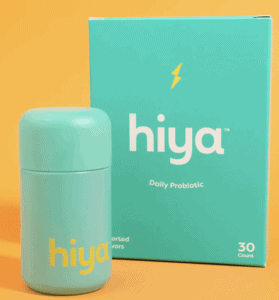
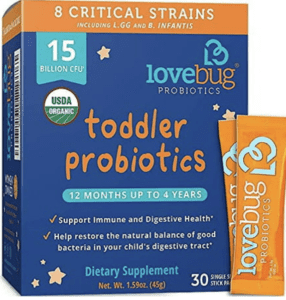
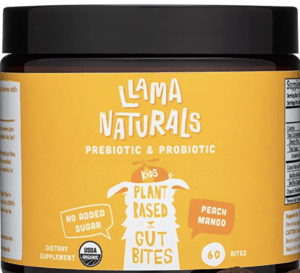
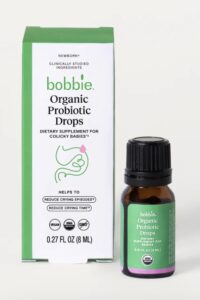
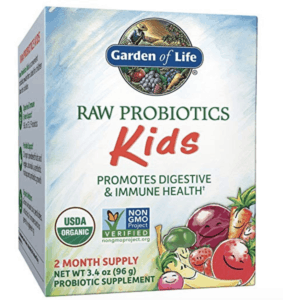
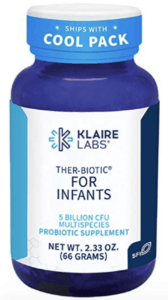
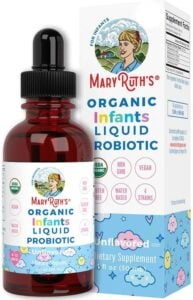
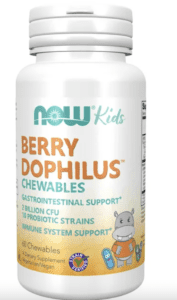
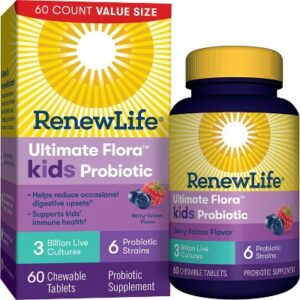
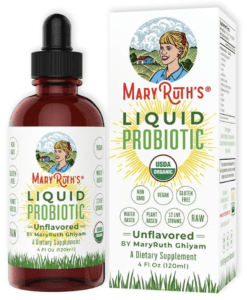
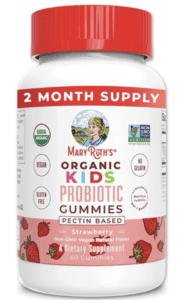
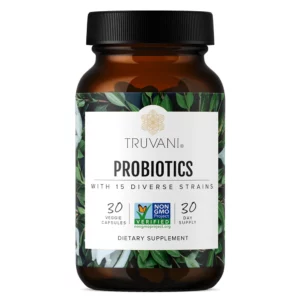
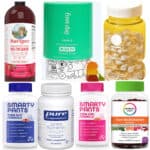
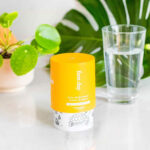



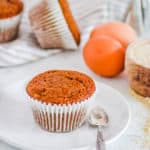

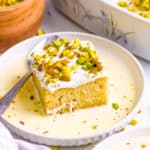


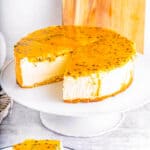

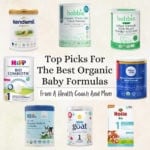



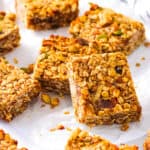



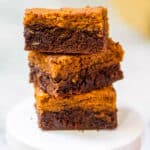







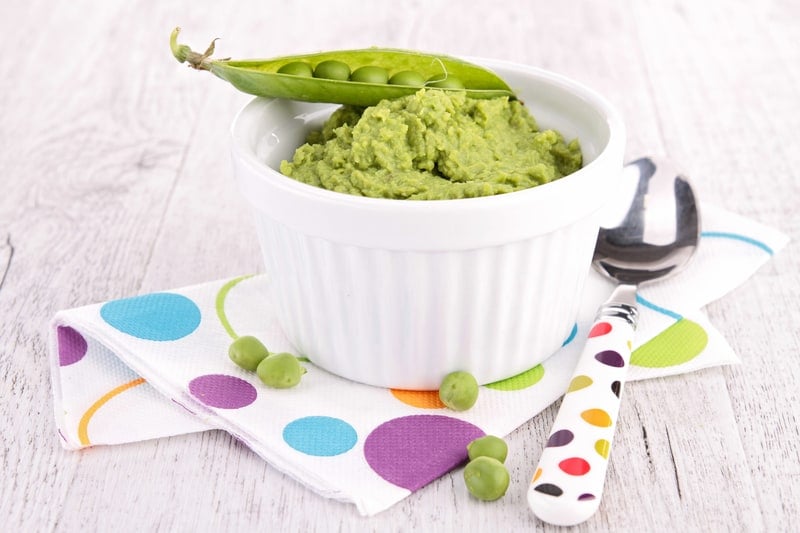
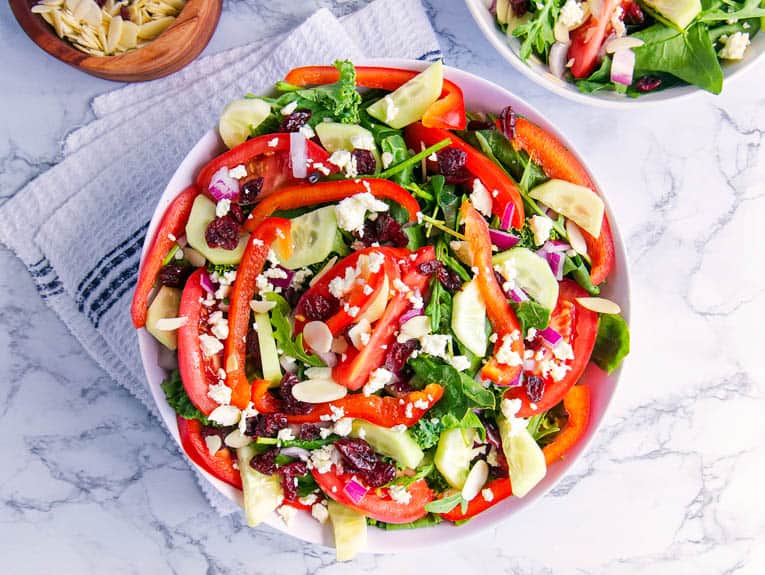


How about Hyperbiotics Pro-Kids?
Hi Ashlee! Hyperbiotics Pro-Kids is good, but it only contains 3 billion CFUs, so that’s why I recommend one of the other probiotics on this list instead. Hope that helps!
My family uses LoveBug Probiotics and they have been amazing for our son that had colic. As he’s gotten older we have continued to use their probiotics. Should be on the list with their clean ingredients. They have probiotics from infants to adults.
Thanks so much for the tip Miranda – LoveBug looks great and I have added them to this list!
DO YOU RECOMMEND MOMMY’S BLISS PROBIOTICS OR BIOGAIA PROBITOICS? I’M LOOKING FOR ONES TO GIVE MY 5 WEEK OLD AND THESE CAN BE GIVEN TO THIS AGE RANGE.
Hi Erica! Yes for babies that young, either Mommy’s Bliss or BioGaia would work! For older kids I recommend one of the probiotics on my list since there is only one strain of probiotics included in both Mommy’s Bliss and BioGaia which wouldn’t be enough for a toddler or older child. Hope that helps!